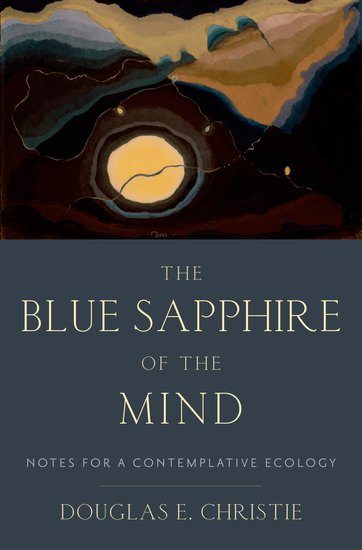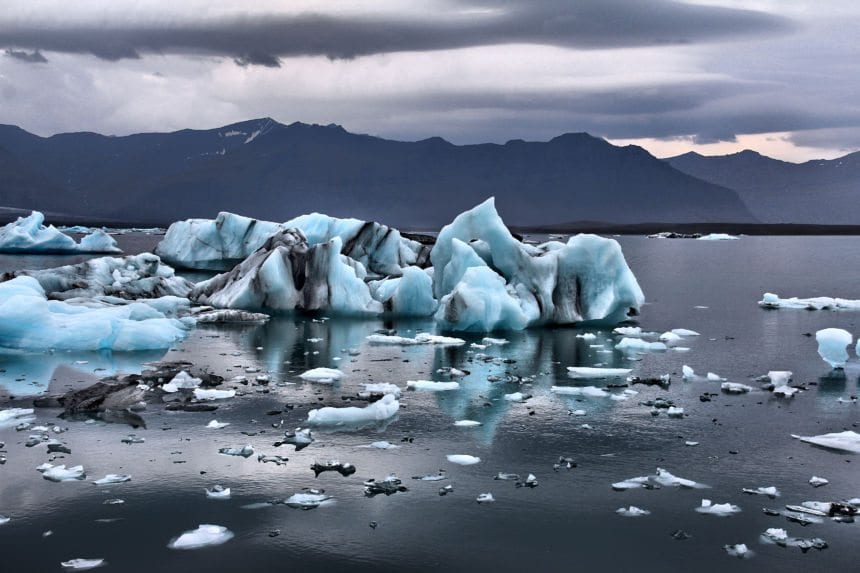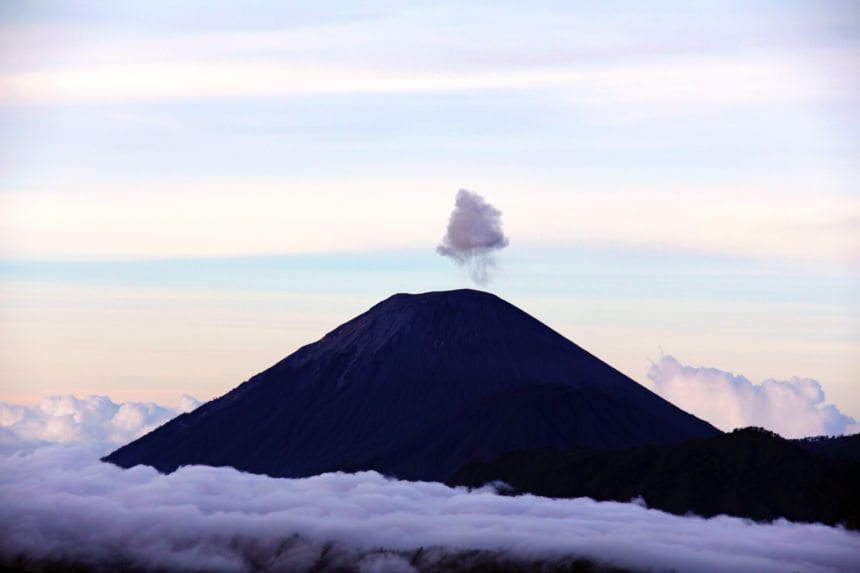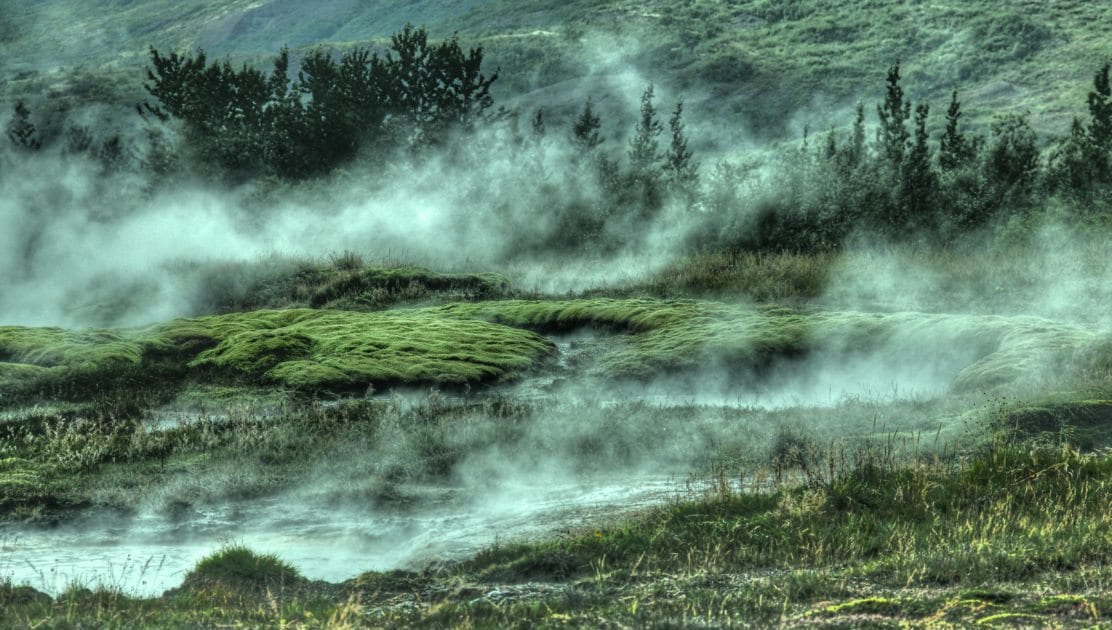Toward a Contemplative Ecology
A Conversation with Douglas Christie and Andrew Zolli
By Andrew ZolliIn the past two centuries, human health and wealth have advanced as never before. While inequalities still bedevil us, on the whole, the current generation of human beings are living longer, more abundant, and more prosperous lives than any in our history. The product (and propulsion) of this prosperity has been an explosion in human knowledge and capability, unrivaled since the Enlightenment. We know more, enjoy more, and can do more than our forebears could have imagined just a generation or two ago.
Yet this civilizational triumph has come at a profound cost. For ours is also an age of environmental brutality on a global scale—marked by mass extinction, the overfishing and “plastification” of our oceans, and the ever-more catastrophic consequences of climate change, among much other malevolence. Humanity is now not merely influencing the planet, but altering its basic, life-giving systems—and in the process, imperiling ourselves, and countless other living things.
We tend to measure the perverse progress of these environmental catastrophes in the abstract language of accountancy—in hectares lost to deforestation, or metric tons of carbon dioxide pumped into the atmosphere.
But the ecological crisis also reflects something deeper and more intimate: a spiritual crisis—one of perspective, meaning, solidarity, and practice. And therein, perhaps, lies not only our indictment, but our hope.
Douglas Christie is a Christian theologian, professor at Loyola Marymount University, and the author, most recently, of The Blue Sapphire of the Mind: Notes for a Contemplative Ecology. In the book, Christie interweaves concepts from early Christian contemplatives, the American transcendental tradition, and the contemporary ecological crisis. In so doing, he ties together ancient practices and modern concerns, and provides signposts on the contemplative’s journey to a new relationship with both the self and the world. In this Earth Day dialogue, he explores these ideas with Andrew Zolli, the Garrison Institute’s President.
 Andrew Zolli: In The Blue Sapphire of the Mind, you introduce concepts from the practices of early Christian contemplatives and explore their resonance in a modern world marked by a deepening ecological crisis.
Andrew Zolli: In The Blue Sapphire of the Mind, you introduce concepts from the practices of early Christian contemplatives and explore their resonance in a modern world marked by a deepening ecological crisis.
I was struck, throughout, by a kind of dual meaning of the subtitle of the book. A “Contemplative Ecology” might be understood as ecology in the traditional, biological “web of life” sense, as filtered through a contemplative’s perspective. It might also be understood as an “ecology” of inner contemplative practices that draw us toward an ever-more deeply-lived life. There is a kind of metonymic relationship between the two.
With that in mind, let’s start with the first concept you introduce, penthos, which you frame as a profound experience of loss and grief.
Douglas Christie: Penthos is about the gift of tears. We get close to understanding penthos in the Christian tradition when we speak of “repentance,” even though that’s one of those words that has a really bad reputation. As soon as you bring up repentance, you start feeling terrible about yourself and everything you’ve ever done. In fact, repentance is a beautiful idea that has to do with practicing a kind of honesty with yourself about the whole of who you are—all of your longings and aspirations for what monks would call “purity of heart,” as well as all the habits and dispositions that have prevented you from opening up to the world.
In the Christian monastic tradition, tears were understood to be a kind of signal or indicator that the heart was breaking open. For the monks, the meaning of these tears was often very ambiguous. There was sadness and regret around the awareness of your complicity in having caused suffering for yourself and others, but there was also something close to joy. The relief of tears signified a dam bursting, an opening up of the soul to stand more honestly in relation to reality.
These kinds of tears are sometimes seen in our contemporary world when people reflect on our relationship with the natural world. Of course, some might disagree and say that we’re simply in denial about the whole situation on a cultural level. But in that case, our inability to mourn and our repression of tears seems like something worth addressing.

Andrew Zolli: Indeed, an honest encounter with the climate crisis often brings deep tears, which can move us from impassivity into either action or despair. I’m sure that at least some climate denialism, and much climate apathy, is rooted in an instinctive repression of those tears—an inability to look at facts that seem too painful to process, and too challenging to the status-quo of our self-constructed lives. It’s hardly surprising that a culture of endless distraction and of ecological repudiation emerged at the same time; sometimes it seems to me that in American culture we either recoil from honest tears or drown in false ones.
But, as you’ve suggested, tears can serve a deep spiritual purpose—to demonstrate an understanding of the mirrored brokenness between the heart inside and world outside.
Douglas Christie: It’s worth noting that, in the Christian monastic tradition, tears were bound up and connected with practice. For the monks it was a question of, How might I turn this poignant moment of self-awareness back into my already seriously considered practice? And the second thing is that these tears were connected to community. In traditional literature, tears often show up during a conversation between an elder and disciple as the result of some kind of probing of a moral or spiritual question that is of great significance to the one who is seeking help.
What do you do with those tears? Well, inevitably, there was a communal response to this question. You turn your attention back to the community with clearer eyes, with a deeper sense of commitment, and a greater sense of openness. I’m not saying that this simple analogy will tell us how to not feel overwhelmed at the crisis we’re facing, but there is a lesson to be learned, I think, in reflecting on how an opening up of the soul or the heart can lead people back to their existing communities. In many ways, that’s where an opening wants to be realized.
Andrew Zolli: In these days of polarized, sorted-out communities, that turning back to community can sometimes seem daunting. It can be hard to know where to engage. But in my own work on community resilience, I often see an analogue of the experience you’re describing. In the wake of a major disaster, the marks of ordinary time and identity are lost, and the experience of radical loss drives some people to a place that is primal and communal. Connections to people and place intensify. The unimportant stuff falls away, and something deeper takes its place. After devastating tornados rampaged through one town, I observed a man rubbing soil on his arms and face, almost practicing a form of communion with the place. Another began replanting a garden even before her house was mucked out. And it doesn’t just occur in disaster-zones: after 9/11, anthropologists working for the National Parks Service found hundreds of makeshift shrines erected in forests and wildernesses throughout the United States.
That all speaks to the critical element of topos, which you define as a deep sense of place. Yet I find myself contrasting that idea with our more everyday experience of place in the modern world, which seems increasingly fragmented. Thanks to technology, we often occupy more than one place, space, and community simultaneously: I’m here in my office, on the phone, on social media, sometimes all at once. I can be situated in more than once place—socially, psychologically—from moment to moment. There’s a paradox there: on the one hand, I have more places where I might experience meaning, more places to find community; but I can also more easily be dislocated from the place I’m really “in” at the moment. And this seems closely related to the next term you introduce, prosochē, which concerns the the nature of attention.
Douglas Christie: Well, it seems clear to me that at least part of what the growth of mindfulness in our culture is about is a longing to find a meaningful response to the unbearable complexity of our lives. In our spiritual traditions—whether Christian, Buddhist, or otherwise—there are historical precedents for both individuals and communities who practice some form of retreat or withdrawal. They remove themselves and they give shape to a form of life that narrows down the range of what people are attending to.
In the monastic world, there is a certain amount of time for silence, a certain amount of time for manual labor, and, when the bell rings, you stop what you’re doing and go recite or chant the psalms or other sacred texts. Even if that monastic model isn’t viable for many of us, I think there’s a reason why people are looking to these traditions for help. They point to the possibility that you can strip away some of the extraneous things that are always calling for your attention and be intentional about paying attention to fewer things with greater awareness and greater heart.
In our culture, there’s always a danger of turning these practices into individualistic activities, but I think practices of attention can lead us back to a place that roots us in one another’s company and allows us to be present with each other in our joys and suffering. It’s a way of being present instead of absent.
Andrew Zolli: That presence is, for me, one of the central promises of a contemplative ecology—that by calming our minds and settling our attention, we can amplify our ability to be fully alive to the beauty, inherent strangeness, and interconnectedness of the world as a living system. By reducing our distractions, we’re able to discern the interrelationships across this pulsing, creative, dynamic whole, and to commune more deeply with the world as it is.
I think this naturally brings us to logos, which is an intrinsic, deep, and creative principle. How does logos relate to this larger discussion about attention and place?
Douglas Christie: In the Christian tradition, it seems that the language of creation is often the standard point of reference for how we might revere and respond to the natural world. The world was created by God and is seen as good, and therefore we have an obligation to respect it and respond to it.
Of course, that’s a beautiful and valuable principle. But I think it’s worth noting that it hardly scratches the surface of how the Christian tradition has always understood the created world, which is that God is pulsing through every living thing. If you take this basic theological idea in Christianity—that everything that exists came into being through the Word of God—then that invites you to really listen to the world itself in a different way. Every living being gives voice to this profound, sacred reality.
If you do this, you’re listening to the voice of the beloved in and through everything. You’re not flattening everything out, as if the cry of the hawk is the same as the sound the wind makes when it rustles through the trees or the sound of a pinecone that hits the earth. No, they’re all manifesting different and distinct tonal qualities. This is religiously important.

Andrew Zolli: This reverence for the symphony of creation sets up the context for love, for eros, which you frame as a healing force. How do you distinguish between that kind of love and other ways people talk about love?
Douglas Christie: There are Christian theologians whose theology is informed by the ancient Greek idea of eros, which, when it’s connected with the understanding of the divine, is the yearning of God for the world. It becomes the source of our own yearning for connection with one another, God, and all of reality.
When eros becomes part of a spiritual practice, it’s the capacity that we have to open ourselves up to places on the edge. It can foster an experience of being drawn into the life of the other. It’s often about surrender, vulnerability, tenderness, and receptivity to the other, who is beckoning to us. We both do and don’t want to let ourselves become this vulnerable, but the language of eros invites us to consider how enlivening and enthralling these exchanges are.
It’s also complicated, of course, as we can see in our ambiguous, often-conflicted responses to the possibility of intimacy in human relationships. Instead of practicing simple openness, too often we project our own anxieties onto the other. We do this out of fear, insecurity, or a kind of uncertainty about whether letting go in love is really possible—or whether we are capable of such release. In the mystical tradition, this manifests itself as an apprehension about letting go to experience the infinite other.
Can we really open ourselves to the life of the other, without the ego closing off this very possibility? Can we inhabit a place of receptivity? Can we allow the life of the other to flow into us and inform and shape us? If so, then we also begin to develop another way of understanding community and our own sense of belonging.
Andrew Zolli: I am reminded of the ecological concept of the ecotone, the place where two biomes meet—like a marshland between a river and the riverbank. These can be places of tremendous genetic richness, biodiversity, and flourishing.
Yet there is a hard-edged transactionalism in contemporary society that seems to work against this kind exchange, in which we open ourselves to being deeply influenced by the other. In every respect—in our psyches, institutions, relationships, and use and stewardship of resources—our culture seem to encourage zero-sum thinking by default.
Here in the West, that’s especially true in terms of the climate. Narratives of power, dominance, and a kind of manifest destiny pervade—civilization is seen as a victory over nature, and any other response is framed as radicalism or capitulation. But there are interesting signals appearing from the East. In the last few years, China has put forth a different, aspirational model of development—to become an “ecological civilization,” rooted in Confucian concepts of harmonious environmental, material, social, and spiritual development. Of course, nobody fully knows yet what that means in practice, but it’s an important narrative opening.
I must say that it was a bit jarring when your book moves from eros to the following concept of kenosis. What is kenosis and how does it fit alongside eros?
Douglas Christie: Yes. Well, the idea of kenosis was haunting me the whole time I was writing the book. In the Christian spiritual tradition, it refers to the experience of radical self-emptying and the sense of being emptied out completely. Kenosis in the context of this book evokes the sense of emptiness and loss that we sometimes feel in the presence of suffering and death, when we sense that the world is not always benevolently oriented toward us. We know this. At least from our limited perspective, the world doesn’t always seem to have our best interests at heart. When we reflect on this fact, we sometimes experience an emptying out of meaning from our lives and from the world itself. It takes integrity to stand in that condition of uncertainty without making up some meaning where there isn’t one.
For me, the idea of kenosis connects deeply with the attitude Pope Francis calls for in Laudato Si. As we turn our gaze toward the suffering world, he suggests that we are being called to a deeper, more painful awareness: “Our goal is . . . to become painfully aware, to dare to turn what is happening to the world into our own personal suffering and thus to discover what each of us can do about it.” The joy we feel at our deep erotic intimacy with the living world calls forth from us a painful awareness of all that is being lost, and an ethical call to engage in the work of healing.
Andrew Zolli: I’m struck here by the distinction between empathy, feeling the pain of others, and compassion, feeling a motivating, active concern and solidarity for the pain of others. In the face of the enormity of others’ suffering—and the world’s—there is more pain than we can internalize. In an effort to do so, we run the risk of empathy fatigue and burnout. It’s critical to transform empathy into compassion and compassion into action—to keep it productive. I was listening to an activist the other day, who said her mantra in the current political climate has become to “turn her pain into political capital”—relentlessly refocusing on purposeful action.
That brings us naturally to telos, which is about how we come to embrace a purpose which carries us out back into the world. We start to think about how to re-inhabit the world after we’ve reconfigured our attention and come into communion with our place. Can you reflect for a moment on telos and purpose?
Douglas Christie: Well, it’s worth acknowledging that many of our spiritual traditions give careful attention to the idea of purposelessness, a letting things be what they are for their own sake. It is an expression of non-attachment that reminds us that we should take care to avoid turning everything into our own play things that only serve our agendas. Also, it reminds us that not everything has to be understood as having utility or purpose, which is another way that we visit our obsessions on the world.
I think at their deepest levels our spiritual traditions invite us to recognize that we have a capacity to experience freedom. That freedom alone can be the source of tremendous healing in the world. And, actually, telos challenges us to undo our sense of purpose-driven existence that often confuses what is essential for what is peripheral or secondary. It opens up some part of our own awareness to the gift of existence. With that awareness, we can respond to the world.
Andrew Zolli: I think one of the things that’s interesting about a contemplative ecology in this time of crisis is that there is this balance to strike between detachment and radical engagement. It’s often true that people on the forefront of social action sometimes need to detach. They need to come up for air. They’re swimming very deeply in dark water—on behalf of all of us—but, as you say, there’s something perfectly divine about experiencing purposelessness—the gift of undirected being—before they dive back in.
Douglas Christie: You’re right that there is a sense of urgency to our current situation and contemplative practice can’t be allowed to be a kind of vacation from attending to what’s happening in the world. Even in our practice we have to be fully alive, alert, aware, and responsive to the realities of the world, including suffering and brokenness. But I’m also convinced that there has to be room in our collective reality for stillness, emptiness, and spaces that aren’t filled up. It’s just critical to our well-being. Our capacity to make a meaningful response to the fragmentation and alienation we are experience will depend on it.
Whatever new sense of wholeness we’re groping our way toward, it needs to include contemplation and active engagement. The early Ignatian contemplative tradition has a wonderful phrase: simul in actione contemplivus, which can be roughly translated as contemplative even while engaging in action. A rich simultaneity in which contemplation and action are understood as profoundly woven together in our lives.
Images courtesy of Gian-Reto Tarnutzer

This article speaks exactly to where I am this Earth Day, a day that seems less about celebrating nature and more about healing our fractured collective and individual spiritual identities. Perhaps by turning intentionally and courageously towards this crisis of meaning and belonging, we may find ourselves necessarily broken and even lost. Our hope is that we may then be reclaimed, by that which we are, and in that nourished and ultimately inspired to wise response.
May we all cultivate a courageous love for this precious and miraculous world.
Thank you for a glimpse into a good conversation that is inspiring and insightful. It helps to underscore the deep spiritual oneness, the connection of how God incarnates God into the Earth.